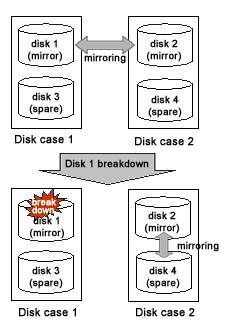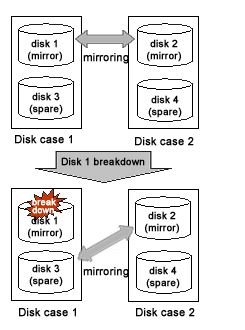A spare disk automatically connected in the event of I/O error in a mirrored disk is selected from spare disks that are registered with the failed disk's class. There are two modes for selecting spare disks: external mode and internal mode.
External Mode (Default)
If an I/O error occurs in a disk of a disk array unit, this method selects a spare disk that belongs to a different disk case from that of the failed disk.
If an I/O error occurs in a disk irrelevant to a disk array unit (such as an internal disk), this method selects a spare disk that is connected to a controller different from that the failed disk is connected to first.
If no applicable spare disk connected to a group, this method selects a spare disk that belongs to the same disk case or is connected to the same controller as that of the disk with the I/O error is selected.
Features:
If an I/O error occurs in a disk, there are possibilities that the I/O cable of the disk case has an error, the entire disk case is down, or the controller has a breakdown. By searching for a spare disk starting from a different disk case or controller from that of a disk with an I/O error, a normal spare disk can promptly be found and early mirroring recovery becomes possible.
Figure 3.6 Hot Spare in External mode

Internal Mode
If an I/O error occurs in a disk of a disk array unit, this method selects a spare disk that belongs to the same disk case as that of the failed disk.
If an I/O error occurs in a disk irrelevant to a disk array unit (such as an internal disk), it selects a spare disk that is connected to the same controller as that of the failed disk.
When no applicable unconnected spare disk is found there, spare disk automatic connection is not performed.
Features:
A configuration that mirrors disks belonging to different disk unit cases or connected to different controllers is the configuration with high-availability, which secures continuous operations even if one of the disk cases or controllers fails. By selecting a spare disk that belongs to the same disk case or is connected to the same controller as that of the disk with an I/O error, the configuration with high-availability can be maintained.
Figure 3.7 Hot Spare in Internal Mode

Note
When an I/O error occurs in a disk of the disk array unit, in order for the Hot Spare functions to work as specified by the Hot Spare mode, the configuration must fulfill the following three conditions:
The multiplicity of mirroring is two.
The two disks to be mirrored belong to different disk array cases.
The spare disks, which are registered in the classes to which the mirrored disks belong, are in the same disk array cases to which the mirrored disks belong.